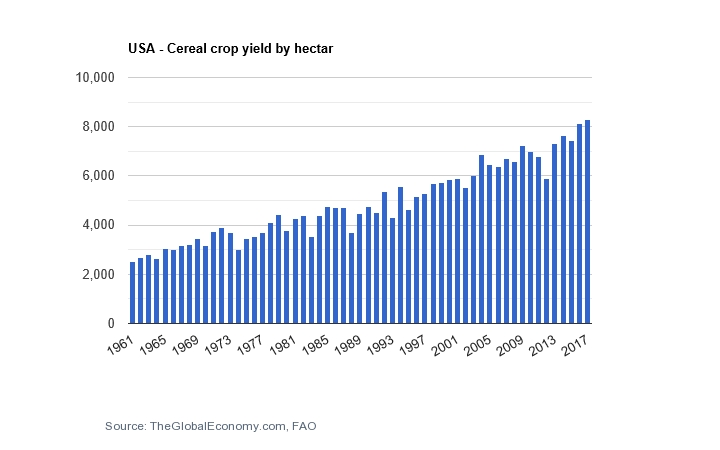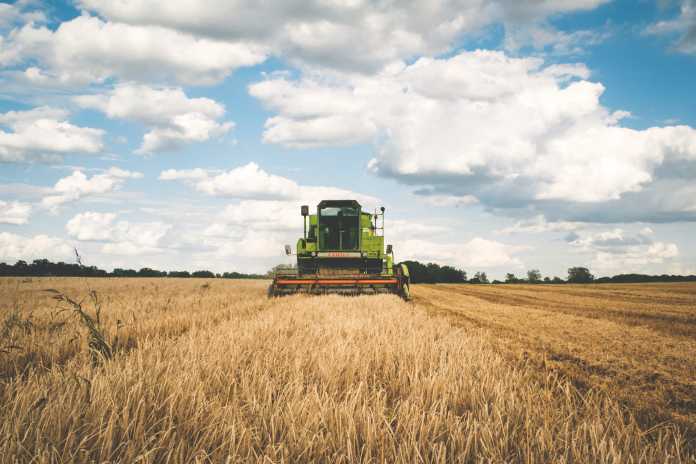A speaker at a Cigar Society of Chicago event tonight is delivering a talk titled, “Climate Change Is Disrupting America’s Heartland: What We Can Do About It and What We (maybe) Can’t.” The title indicates the speaker will paint a picture of climate disruption throughout the American Heartland. The reality is entirely different.
A summary of the talk asserts climate change is creating flooding, drought, and pressure on insect populations that boost agricultural production.
Let’s examine each of these assertions in order, citing objective data, evidence, and facts.
Flooding
Floods – including very severe floods – have occurred throughout human history, and even before human history. Global warming did not create floods. Nor has global warming made flooding any more frequent or severe. When alarmists point to a particular flooding event and claim climate change is to blame, the assertion defies objective data and even the findings of the United Nations Intergovernmental Panel on Climate Change (IPCC).
As documented in Climate at a Glance: Floods, the IPCC reports “low confidence” in any climate change impact on floods. Moreover, the IPCC even acknowledges that climate change is as likely to have reduced flooding frequency and severity as it has been to make them more common.
IPCC relied on much objective data and many scientific studies to reach its conclusion. For example, scientists examined 70 years of rainfall and flood data and wrote up their results in the peer-reviewed Geophysical Research Letters, finding wet and dry extremes are becoming milder. They report, “On average, dry regions/months became wetter and wet regions/months became drier….”
Similarly, scientists report in the peer-reviewed Hydrological Sciences Journal, “It has not been possible to attribute rain-generated peak streamflow trends to anthropogenic climate change over the past several decades.” Moreover, “no gauge-based evidence has been found for a climate-driven, globally widespread change in the magnitude/frequency of floods during the last decades.”
In short, compelling scientific evidence shows climate change is not causing any increase in the frequency or severity of flooding. Of course, some flooding – including severe flooding – will continue to occur, just as it always has. But that doesn’t mean global warming caused it. The scientific evidence, in fact, shows just the opposite.
Drought
As documented in Climate at a Glance: Drought, the United States is benefiting from fewer and less extreme drought events as the climate modestly warms.
- In 2017, and then again in 2019, the United States registered its smallest percentage of land area experiencing drought in recorded history.
- The United States is currently undergoing its longest period in recorded history with fewer than 40 percent of the country experiencing “very dry” conditions.
- The IPCC reports with “high confidence” that precipitation has increased over mid-latitude land areas of the Northern Hemisphere (including the United States) during the past 70 years, while IPCC has “low confidence” about any negative trends globally. (See https://www.ipcc.ch/site/assets/uploads/sites/2/2019/06/SR15_Chapter3_Low_Res.pdf, p. 191.)
Insects
Climate alarmists try to call both sides of the coin-flip regarding insects. In several recent studies, alarmists claim global warming will cause an increase in the insect population, which they say will be harmful to crops. More recently, as the predicted insect plagues have failed to develop, alarmists claim global warming will cause a decline in the insect population, which they say will be harmful to crops. Actual science does not involve predicting two contradictory outcomes and then claiming “Heads I win, tails you lose.”
Crop Production
At its core, alarmist insect predictions claim the same impact – more insects will reduce crop production, or fewer insects will reduce crop production. Well, we have had approximately 150 years of gradual warming since the Little Ice Age ended (and that warming began long before humans invented coal power plants and SUVs). Any negative impacts on crop production, be it from more insects or less insects, should be readily apparent by now. Let’s take a look at actual crop data and see.
As shown in Climate at a Glance: Crop Production:
- As our planet gradually warms, global crop yields are setting new records almost every year.
- U.S. crop yields continue to grow, setting new records nearly every year.
- Longer growing seasons, warmer temperatures, fewer frost events, and more atmospheric carbon dioxide are creating ideal crop conditions.
Almost every important U.S. crop has set record yields per acre during the past three years. Most of the top-10 years in yields-per-acre occurred during the past decade. For example, each of the three record-high corn yields have occurred during the past three years. Each of the five record-high rice yields have occurred during the past five years. Each of the past nine years have produced top-10 all-time wheat yields.
The graph below is provided by The Global Economy, with United Nations Food and Agriculture Organization data.

The same holds true for Illinois. Each of the seven years with the highest corn yields in Illinois history have occurred during the past seven years.
Conclusion
Floods, droughts, and other extreme weather events have always occurred, and will continue to occur. Global warming will not make them entirely disappear. Nevertheless, it defies sound science to blame climate change for the extreme weather events that still do occur. Sound science shows that, if anything, flooding, droughts, and other extreme weather events are becoming less frequent and less severe in a warming world.
So, sit back, relax, and enjoy a cigar without fretting over the mythical climate change apocalypse! : )


















[…] The Heartland of America Is Clearly Benefiting from Climate Change — Climate Realism Werbeanzeigen […]
There’s something else which we skeptics need to address, in my view. As the Himalayas warm, so alarmists say, the ice will melt, and therefore 400 million people will be getting less water, as annually the water flows down the mountains in streams.